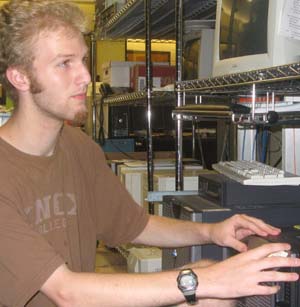

Venture Boldly

Chris Johnson, a computer science and math major, is used to working with algorithms and stringing math variables together to achieve a solution. But when David Bunde, assistant professor of computer science, asked him to assist with a summer research project, Chris had a new challenge.
“Learning to live on my own this summer was a test. I soon realized that if I didn’t go to the grocery store there wasn’t going to be food.”
When he is not working out the details of daily life, Johnson is making supercomputers run more efficiently. His work includes finding a way to unblock computer processor traffic jams on supercomputers used in science, engineering and finance laboratories and research institutions.
These supercomputers cost tens of millions of dollars and have hundreds of processors connected by miles of wires.
Setting the Agenda
In the daily grind with most supercomputers, a user submits a job to be completed and specifies how many processors are to be allocated to that job.
Trying to determine when to run certain jobs to make the machine most efficient and to get the most work done in the lease amount of time involves scheduling each job that comes in, and allocating the processors by number and location to avoid jobs interfering with each other.
“Jobs can slow down. The jobs may be connected together and if more than one job is trying to communicate with a given set of wires, there is a network conflict and message passing conflict. It is kind of a traffic jam,” Johnson says.
Since computer processor speeds will not improve and the physical limits of processors is approaching, the search is on for a new way to improve computing speed. Algorithms work on improving the efficiency by allocating the workload to various processors. Instead of having a single computer do all the computations, the work is divided among a network of computers.
Johnson’s summer project involved helping Bunde analyze these algorithms, so computers can work faster and more efficiently.
“If there is a supercomputer with 100 processors and a job comes in that needs 90 processors and another job that needs 20 processors, they can’t both be done at the same time. If the 90 processor job is running, there are still 10 processors not being used, and the supercomputer still has only 90 percent utilization. This is less than the best utilization.”
Johnson says that the owners of these supercomputers also have a vested interest in increasing their efficiency. “They have these big machines that are sitting around and not doing much because we don’t know how to allocate the jobs for the computers. We are looking for better algorithms to make the process faster,” Johnson says. “If the supercomputers can perform more work, they are worth more to the owner.”
Why Knox?
After a summer long tour of at least a dozen colleges highlighted in Loren Pope’s book, Colleges That Change Lives, Johnson says he selected Knox because “it has a strong academic program, and Knox had the best computer science program.”
“But, it was my visit to Knox that sealed the deal for me,” he says. It wasn’t just the professors Johnson met along the way, but as he says, “I felt I would be challenged here. I liked the community too. I went out and listened to jazz within a few blocks of the campus.”
After graduation, Johnson says he plans on attending graduate school. “I’m not sure exactly what I will research or specialize in, but this project will help me.”

Chris Johnson is researching the efficiency of super computers.
Published on August 24, 2008